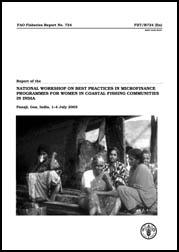|
Villareal, L.V.; Upare, M.A.
Report of the National Workshop on Best Practices in
Microfinance Programmes for Women in Coastal Fishing Communities in India.
Panaji, Goa, India, 1-4 July 2003.
FAO Fisheries Report. No. 724. Rome, FAO. 2003.
50p.
ABSTRACT
In most societies, as in India, small-scale fishing and fish
farming households are considered to be one of the most disadvantaged and
vulnerable groups. Microfinance programmes are seen as a means for these
households to gain access to much-needed credit services that are appropriate
for their needs. Moreover, because women comprise a significant proportion of
such households, microfinance should also serve as an effective tool to assist
and empower women in fishing communities.
It is in this context that the national workshop was
organized. The main workshop objective was to analyse and document recent
experiences with microfinance programmes in support of women and poverty
alleviation in coastal fishing communities in India and to draw conclusions with
regard to best practices in this field. The workshop also aimed to provide
guidance to financial institutions, governmental and non-governmental
institutions involved in fisheries development, fishermen's and women's
associations, donors and other stakeholders for the future development of
microfinance programmes and other necessary support services.
The workshop was organized by FAO, in cooperation with the
National Bank for Agriculture and Rural Development (NABARD) as the host
organization. It was a follow-up to the recommendations of the recently
concluded Regional Workshop on Microfinance Programmes in Support of Responsible
Aquaculture and Marine Capture Fisheries in Asia, held in Chiang Mai, Thailand,
in December 2002.
The workshop, while highlighting best practices in financial
support for women in fishing communities, had a broader and multidimensional
perspective. As such, the presentations, discussions and recommendations were
not only limited to financial support but also covered the following important
thematic areas: government policies and initiatives, research, technology
development, appropriate support services and other financial support and
interventions for the sector. Thirty-nine senior representatives of central and
state fisheries administrations, financial institutions, fisheries research,
academe, training institutions and foundations, fishermen's and women's
associations and an intergovernmental organization participated in the workshop.
|
